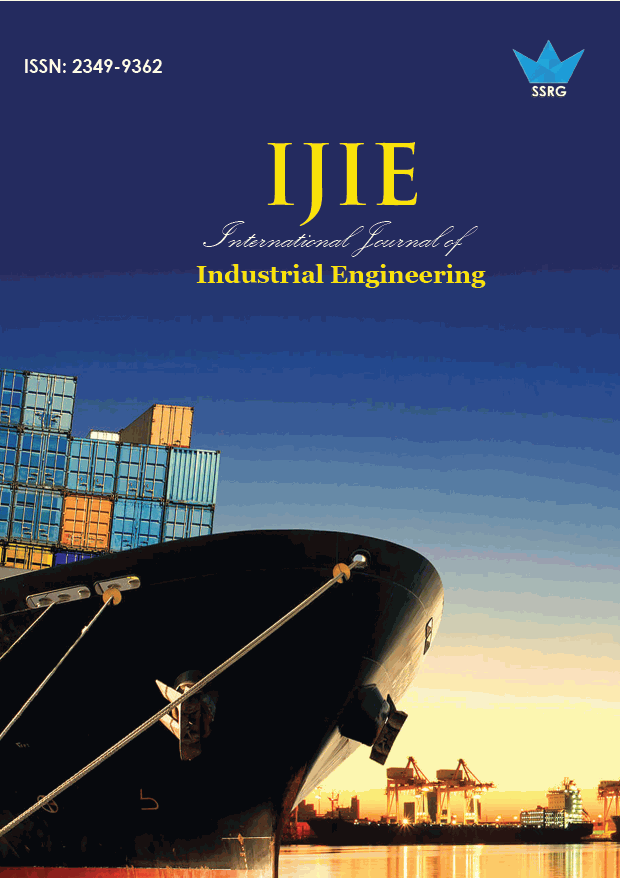Challenges Undermining The Promotion of Non-Oil Export In Nigeria

| International Journal of Industrial Engineering |
| © 2020 by SSRG - IJIE Journal |
| Volume 7 Issue 3 |
| Year of Publication : 2020 |
| Authors : Familusi Olayemi Babawole |
How to Cite?
Familusi Olayemi Babawole, "Challenges Undermining The Promotion of Non-Oil Export In Nigeria," SSRG International Journal of Industrial Engineering, vol. 7, no. 3, pp. 1-8, 2020. Crossref, https://doi.org/10.14445/23499362/IJIE-V7I3P101
Abstract:
Since the 70s, Nigeria has been an experiencing a form of the mono-economy by relying mostly on oil as its major income earner, thereby neglecting other non-oil sectors. This study analyses the challenges undermining the promotion of non-oil export in Nigeria through questionnaire survey used
to obtain descriptive statistics. The sample was determined by simple random sampling technique. The questionnaire consists of closed-ended questions on five-point Likert Scale with options ranging from Strongly Agree (1) to Disagree (5), and was analyzed with the aid of Statistical Package for Social Sciences (SPSS). From the findings, it was revealed that weak infrastructure undermines the promotion of non-oil export in Nigeria. The result of finding in shows that poor access to finance is a major impediment to the promotion of non-oil export in Nigeria. Generally, the finding of the study proves that the lack of continuity in export policies discourage the promotion of non-oil export, thereby undermining the performance of non-oil sector export. From the findings, it was recommended that government should make provision for infrastructure to promote non-oil export in Nigeria. The government should create an enabling environment, such as finance that will enhance the promotion of non-oil export in Nigeria. There should be continuity in export policies to encourage the promotion of non-oil export.
Keywords:
Challenges, Oil, Non-oil, Export, Non-oil export.
References:
[1] About-Stait, F. (2005). “Are Exports the Engine of Economic Growth? An Application of Cointegration and Causality Analysis for Egypt,” 1977-2003. Economic Research Working Paper, 76, Tunis: African Development Bank.
[2] Adeniran, A. O. and Sidiq, O. B. (2018). “Economic Recession and the Way-Out: Nigeria as a Case Study”. Global Journal of Humanities and Social Science: E Economics, 18(1), 1-6.
[3] Dunn, R. M., and Mutti, J. H. (2004). “Trade and Growth” International Economics (6th ed., pp. 221-241). London: Routledge.
[4] Enoma, A., and Isedu, M. (2011). “The Impact of Financial Sector Reforms on Non-Oil Export in Nigeria.” Journal of Economics, 2(2), 115-120.
[5] NBS (2011). Gross Domestic Products to Nigeria 2010-2011/3
[6] Onayemi, S.O., and Akintoye, R. (2009). “Diversifying the Productive Base of Nigeria, an Econometric Approach to the Assistant of Non-oil Export Promotion Strategies”. International Research Journal of Trade & Economics, 24,209–222.
[7] Onodugo, V.A.(2013). “Can Private Sectors Facilitate Economic Growth and Realization of MDG in Developing Countries? Evidence from Nigeria.” African Journal of Social Sciences,3(1), 83-96.
[8] Osuntogun, A., Edordu, C. C., and Oramah, B. O. (1997). “Potentials for Diversifying Nigeria’s Non-oil Exports to Non-traditional Markets”. AERC Research Paper, pp, 68.
[9] Todaro, M. P., and Smith, S. C. (2011). Economic development (11thed.). USA: Addison-Wesley.
[10] O. Usman (2010). “Non-oil Export Determinants and Economic Growth in Nigeria (1985-2008)”. European Journal of Business and Management Sciences, 3(3), 124-130.
[11] Made Kembar Sri Budhi, I Ketut Darma, "The Role of Tourism, Non-Oil and Gas Export, and Economic Growth on Human Development Index" SSRG International Journal of Economics and Management Studies 7.4 (2020): 15-20.

 10.14445/23499362/IJIE-V7I3P101
10.14445/23499362/IJIE-V7I3P101